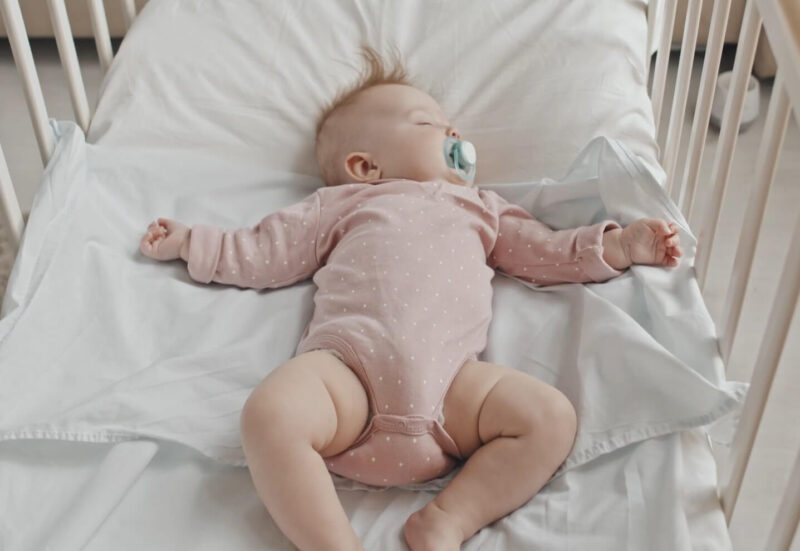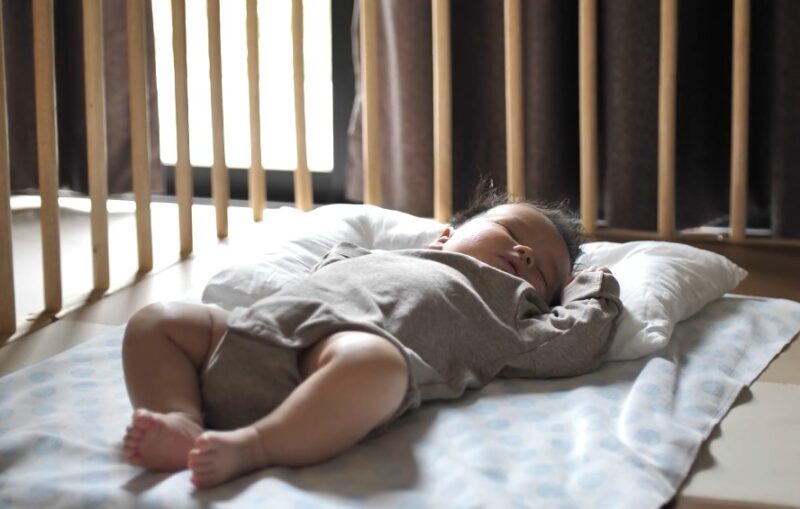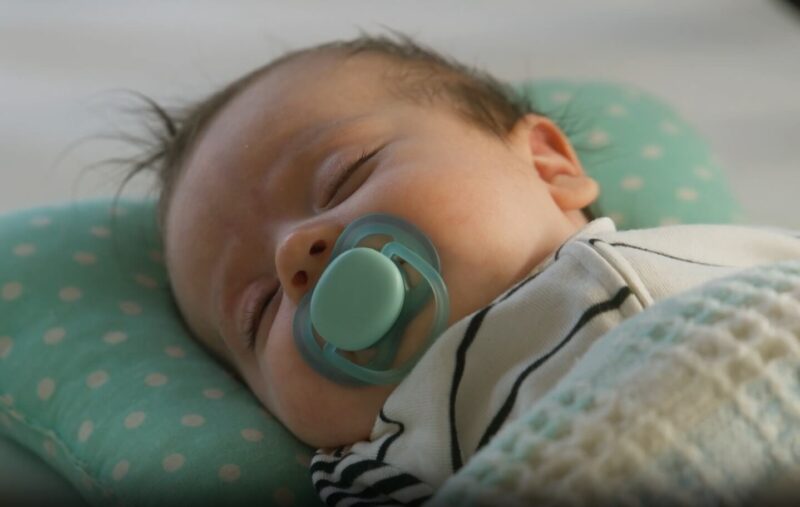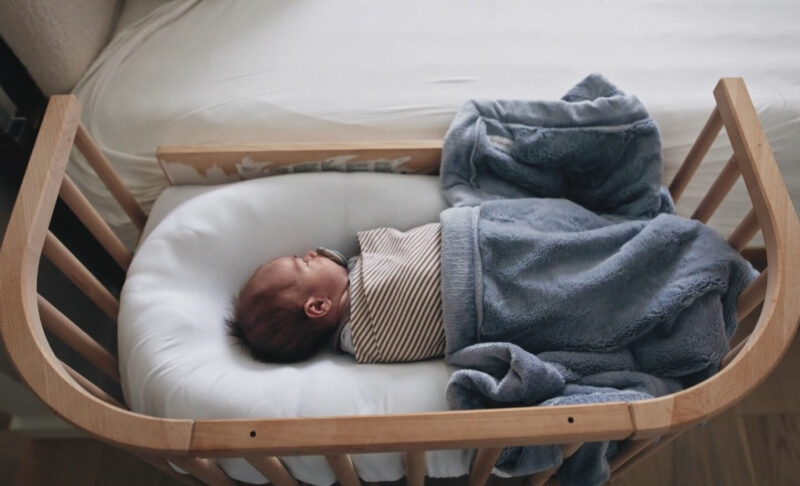Have you ever watched a newborn sleep and wondered what might be going on inside their tiny head? The thought of babies dreaming can spark a sense of curiosity and awe.
Today, we will explore the fascinating world of newborn sleep and what dreams might mean for our littlest ones.
How Newborn Sleep Works

Newborns spend a lot of time sleeping—about 16-18 hours a day for the first few months. Sleep is crucial for their growth and development, particularly because a significant portion of their sleep is REM (Rapid Eye Movement) sleep.
For adults, REM sleep makes up around 20% of our sleep, but for newborns, it’s a whopping 50%. This stage of sleep is often associated with dreaming in adults, but what about babies?
REM Sleep
During REM sleep, the brain is highly active. In adults, this is when most dreaming occurs. For babies, REM sleep serves a slightly different purpose. Their brains are still developing, and REM sleep helps build pathways and connections vital for cognitive growth.
So, while adults might dream of fantastical adventures or mundane daily events, babies’ REM sleep is more about laying down the neural groundwork for future learning and experiences.
Do Newborns Actually Dream?

The big question remains: Do newborns actually dream? Researchers have different opinions on this. Some believe babies might start dreaming as early as two weeks old, based on brain activity studies.
However, it’s unclear if their dreams are similar to those of older children or adults. Babies lack the ability to form abstract thoughts and complex narratives, which are key components of adult dreams.
Sensory Experiences from the Womb
One theory is that if babies do dream, their dreams might consist of familiar sensory experiences from the womb.
Imagine the sound of a mother’s heartbeat, the muffled noises of the outside world, or the gentle rocking motions they felt before birth. These sensations could form the basis of a newborn’s dream content, providing a comforting link to their recent past.
Do Babies Have Nightmares?
Another intriguing topic is whether babies experience nightmares. Most experts agree that nightmares are unlikely in newborns due to their limited understanding of fear and lack of developed imagination.
However, babies can still show signs of distress during sleep, which might be linked to developmental changes or external factors like a sudden noise or discomfort.
The Moro Reflex (A Startling Experience)
Have you ever seen a baby suddenly fling their arms out and start crying while sleeping? This is known as the Moro reflex, a normal developmental reflex in infants.
It’s their way of responding to a feeling of falling or being startled. While it can look alarming, it’s a typical part of early development and not necessarily a sign of a bad dream.
Creating a Dreamy Sleep Environment
To help babies get the best sleep possible, maintaining a regular bedtime routine and ensuring a calm sleep environment is crucial. Here are some tips to create a soothing sleep space for your baby:
- Consistent Bedtime Routine: Establishing a predictable routine can signal to your baby that it’s time to wind down. This might include a warm bath, a gentle massage, or a quiet story.
- Comfortable Sleep Space: Make sure the baby’s sleep area is safe, comfortable, and free from distractions. Soft lighting and a cool room temperature can promote better sleep.
- White Noise: Gentle white noise can mimic the sounds of the womb and help soothe your baby to sleep.
When to Seek Help

If your baby consistently shows signs of distress after sleep, it might be a good idea to consult a pediatrician. There could be underlying issues, such as reflux or sleep apnea, that need addressing to ensure your baby is comfortable and well-rested.
The Role of Sleep in Development
Newborn sleep isn’t just about rest. It’s a critical time for brain development. During sleep, babies’ brains are hard at work consolidating memories and processing information.
This activity helps lay the groundwork for future skills, from motor abilities to language acquisition.
Melatonin and Circadian Rhythms
Even before birth, the hormone melatonin plays a role in regulating sleep patterns. However, newborns don’t have established circadian rhythms immediately.
Over time, as they get used to sleeping more at night, their REM sleep stages shorten, leading to longer periods of deep sleep.
Dream Evolution (From Infant to Toddler Age)

As children grow, their dreams evolve. By the age of two, children typically start to have dreams, though these are often simple and less complex than those of older kids and adults.
Young children’s dreams are usually snapshots of familiar objects, people, and animals rather than elaborate stories.
Dream Recall in Young Children
Interestingly, up to 25% of children may not remember their dreams even when awakened during REM sleep, while adults can’t remember around 10% of their dreams.
This trend can continue through early childhood, making it tricky to pinpoint exactly what young kids are dreaming about.
Final Thoughts
The world of newborn sleep is both mysterious and magical. While we may never fully know what newborns dream about, we do know that sleep plays a crucial role in their development.
Whether they’re reliving womb sensations or simply building essential brain connections, every nap and bedtime is a step towards a bright and capable future. As parents and caregivers, our role is to provide a safe, comfortable, and loving environment that supports healthy sleep habits.
By doing so, we’re not only helping our babies rest well but also nurturing their incredible growth and development. So, the next time you watch your little one sleeping peacefully, take a moment to marvel at the amazing things happening inside their tiny brain.
Their dreams—whatever they may be—are just the beginning of a lifetime of learning and discovery.

